If you want to keep your pool warm and inviting, check out the top electric pool heaters of 2024. The Raypak Crosswind Model 40i stands out with its whisper-quiet operation and WiFi capabilities. For larger pools, consider the FibroPool FH270, offering impressive 70,000 BTU heating capacity. The FH135 model is perfect for smaller pools while maintaining energy efficiency. Don't overlook the WOPOLTOP Full DC Inverter Pool Heat Pump, providing both heating and cooling features. Finally, the ECOPOOLTECH EU57100 is a reliable choice for smaller setups. Explore these options, and you'll find the ideal heater for your needs.
Table of Contents
- 1 Raypak Crosswind Model 40i Heat/Cool Electric Pool Heat Pump
- 2 FibroPool Swimming Pool Heat Pump – FH270 70,000 BTU
- 3 FibroPool Swimming Pool Heat Pump (FH135, 35,000 BTU)
- 4 100,000 BTU Full DC Inverter Pool Heat Pump for Swimming Pools
- 5 Electric Pool Heaters for Above and In Ground Pools
- 6 Factors to Consider When Choosing Electric Pool Heaters
- 7 Frequently Asked Questions
- 8 Wrapping Up
Raypak Crosswind Model 40i Heat/Cool Electric Pool Heat Pump
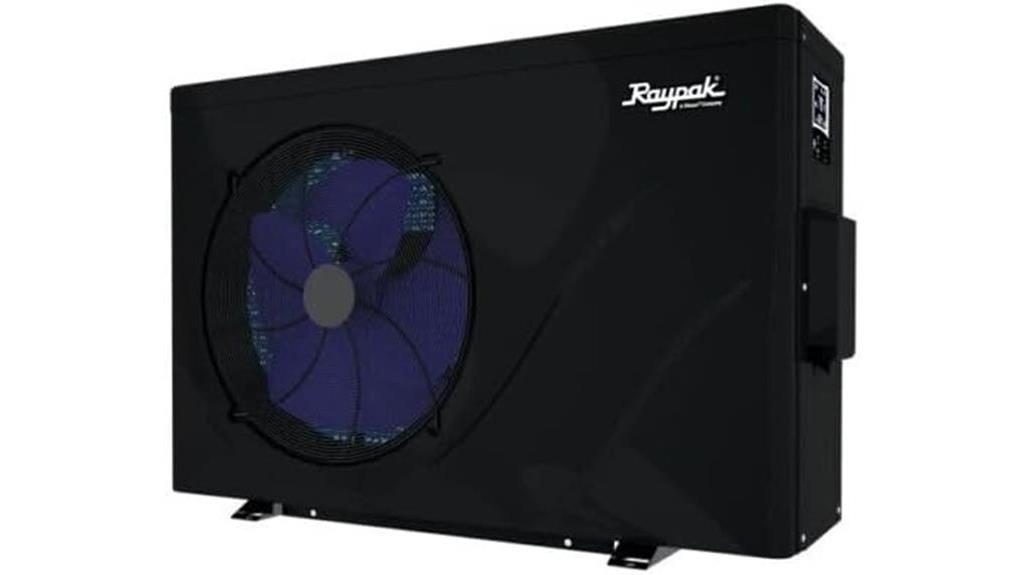
If you're looking for an electric pool heater that combines heating and cooling capabilities, the Raypak Crosswind Model 40i Heat/Cool Electric Pool Heat Pump might just be the best choice for you. With a robust 33,000 BTU output, it effectively raises your pool temperature—like going from 65°F to 84°F in just 2.5 days. Its inverter technology adjusts based on demand, ensuring efficient operation. I love that it's whisper-quiet and WiFi capable, allowing for easy remote control through the Smart Life app. Weighing 124 pounds and designed for both above-ground and in-ground pools, it's straightforward to install if you have basic electrical knowledge. Just remember to consult a professional for ideal sizing and hard wiring.
Best For: Those seeking an efficient and versatile electric pool heater for both heating and cooling their above-ground or in-ground pools.
Pros:
- Whisper quiet operation, making it one of the quietest pool equipment options available.
- WiFi capability allows for convenient remote control via the Smart Life app.
- Efficient heating performance, with a significant temperature increase observed in a short time.
Cons:
- Customer service and product registration issues reported by some users.
- Requires hard wiring, which may necessitate professional installation.
- Performance may vary based on pool size and setup, requiring careful sizing considerations.
FibroPool Swimming Pool Heat Pump – FH270 70,000 BTU
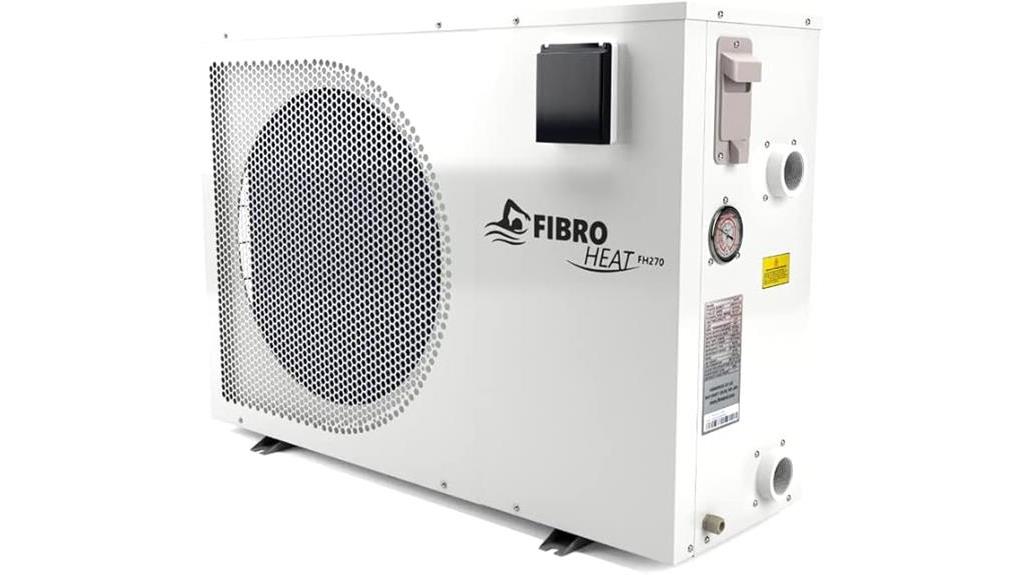
The FibroPool Swimming Pool Heat Pump – FH270, with its impressive 70,000 BTU capacity, is an outstanding choice for pool owners who want an efficient and eco-friendly heating solution. This all-electric heater works seamlessly with in-ground pools up to 15,000 gallons and above-ground pools up to 27 feet round, making it versatile. Its digital control panel simplifies temperature adjustments, and the automatic operation guarantees it runs only when needed. I appreciate its robust design, with a rugged chassis that withstands outdoor conditions. Plus, the energy efficiency is remarkable, as it uses clean electricity to transfer heat from the air to the water. Overall, I find the FH270 to be a reliable option that enhances my pool experience without breaking the bank.
Best For: Pool owners seeking an efficient and eco-friendly heating solution for both in-ground and above-ground pools.
Pros:
- Energy-efficient: Utilizes clean electricity to transfer heat, reducing environmental impact.
- User-friendly: Features a digital control panel for easy temperature adjustments and automatic operation.
- Durable design: Rugged chassis withstands outdoor elements, ensuring longevity.
Cons:
- Limited support: Some customers report issues with tech support and unit malfunctions.
- Climate restrictions: May not perform optimally in dry climates compared to traditional gas heaters.
- Weight and size: At 160.7 pounds and with specific dimensions, it may require assistance for installation.
FibroPool Swimming Pool Heat Pump (FH135, 35,000 BTU)
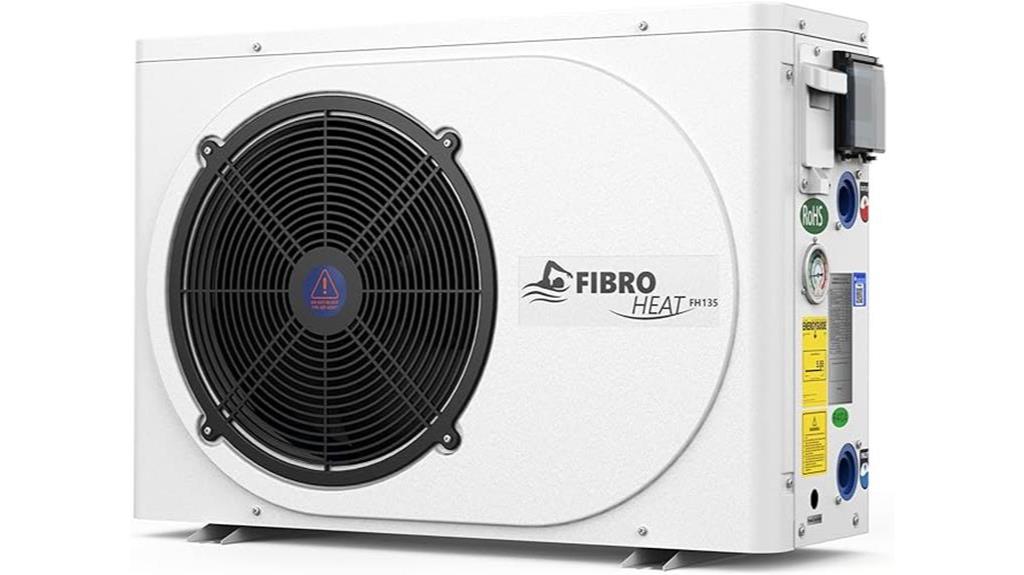
For those seeking an efficient and eco-friendly heating solution for their swimming pools, the FibroPool Swimming Pool Heat Pump (FH135) stands out with its impressive 35,000 BTU capacity. This unit is perfect for both above ground and in-ground pools up to 7,500 gallons. I appreciate its rugged design, featuring a steel chassis that's built to withstand outdoor conditions. Installation is straightforward, and the digital control panel allows me to set and monitor the temperature easily. Users report it can raise water temperatures considerably, like from 66°F to 82°F in just three days. With low energy consumption and quiet operation, it's a smart choice for any pool owner. Just keep in mind, customer support may not be as responsive as I'd hope.
Best For: Pool owners seeking an efficient and eco-friendly heating solution for both above ground and in-ground pools.
Pros:
- Efficient heating capability, raising pool temperatures quickly.
- Quiet operation with low energy consumption.
- Rugged design and easy installation with a user-friendly digital control panel.
Cons:
- Customer support may be lacking in responsiveness.
- Some users report quality control issues.
- Additional equipment, like solar pool covers, may be recommended for optimal heat retention.
100,000 BTU Full DC Inverter Pool Heat Pump for Swimming Pools
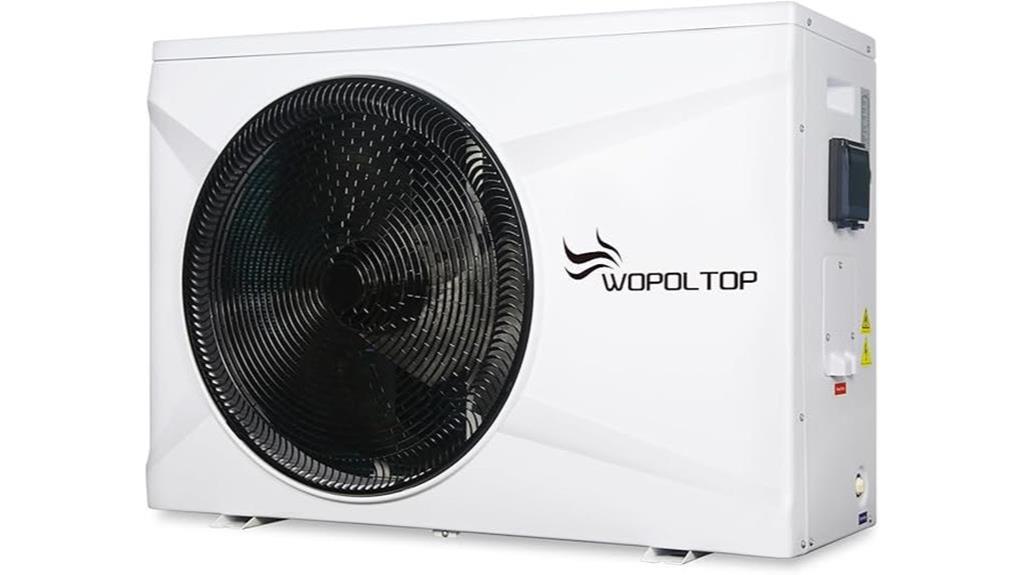
Looking for an energy-efficient solution to keep your pool at the perfect temperature? The WOPOLTOP 100,000 BTU Full DC Inverter Pool Heat Pump could be your best bet. This dual-function unit not only heats but also cools, making it perfect for year-round use. Its impressive COP of up to 6.8 means you'll save on energy bills while enjoying a comfortable swim. It's designed for pools up to 26,000 gallons and features smart WiFi control for easy adjustments. Plus, with noise levels around 47-58 decibels, it won't disturb your peace. The durable ABS casing guarantees it withstands outdoor conditions, but be cautious of lightning. Overall, it's a solid choice for efficient pool heating.
Best For: Those seeking an energy-efficient and versatile pool heating solution for pools up to 26,000 gallons that can be controlled via a smart app.
Pros:
- High energy efficiency with a COP of up to 6.8, reducing energy costs.
- Dual function allows for both heating and cooling, suitable for year-round use.
- Quiet operation with noise levels between 47-58 decibels, ensuring minimal disturbance.
Cons:
- Average customer rating of 3.4 out of 5 stars may indicate mixed user experiences.
- Requires additional adapter for installation, which may complicate setup.
- Vulnerability to lightning, necessitating precautions for outdoor use.
Electric Pool Heaters for Above and In Ground Pools
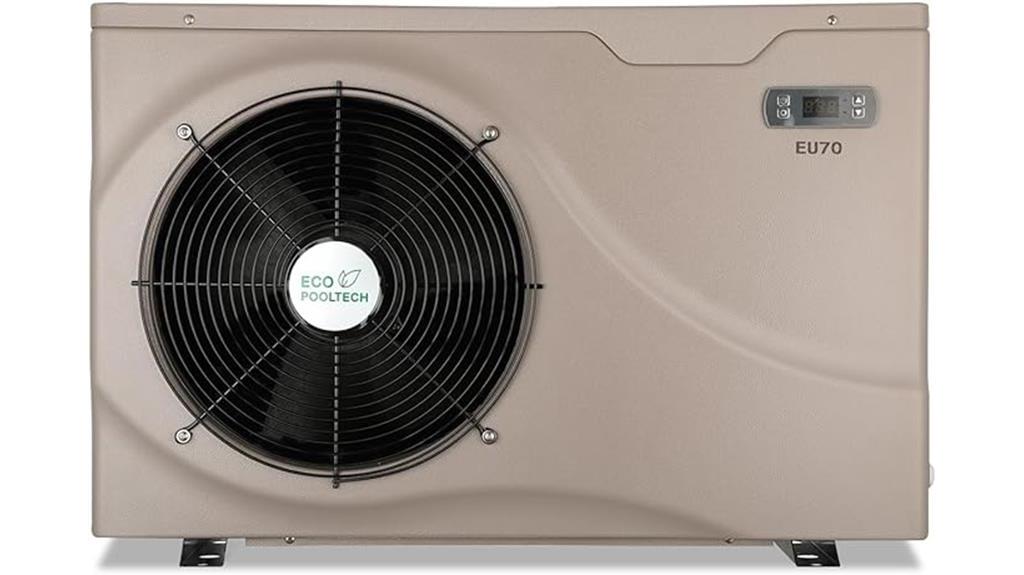
When it comes to heating pools efficiently, the ECOPOOLTECH EU57100 electric pool heater stands out as an excellent choice for both above and in-ground pools. With a maximum output of 22,462 BTU/hr, it's perfect for pools up to 6,500 gallons. Operating smoothly in temperatures from 30F to 100F, it can heat water up to 105F under ideal conditions. I love that its intelligent control system maintains my desired temperature without constant adjustments. Plus, customer reviews rave about its performance, with users easily heating their pools to the mid-high 80s. Installation is straightforward, but you might need an electrician for 220V setups. Overall, this heater makes enjoying a warm pool effortless and efficient!
Best For: Those looking for an efficient and easy-to-use electric pool heater suitable for both above and in-ground pools up to 6,500 gallons.
Pros:
- Efficient heating: Operates with a high heat conversion rate (COP 4.7), providing significant heat for electricity spent.
- User-friendly design: Features an intelligent control system that maintains the desired temperature effortlessly.
- Versatile operation: Functions effectively in a wide range of ambient temperatures (30F to 100F).
Cons:
- Installation requirements: May require an electrician for 220V setups, which can add to initial costs.
- Limited to pool size: Best suited for pools up to 6,500 gallons, which may not accommodate larger pools.
- Dependence on ambient conditions: Optimal heating is contingent upon favorable outdoor temperatures.
Factors to Consider When Choosing Electric Pool Heaters
When choosing an electric pool heater, you'll want to take into account several important factors. Think about the heating capacity you need, as well as the energy efficiency ratings that can save you money in the long run. Don't forget to factor in installation requirements, climate compatibility, and maintenance needs to guarantee you make the best choice for your pool.
Heating Capacity Selection
Choosing the right heating capacity for your electric pool heater is essential for maintaining the perfect water temperature. Start by considering your pool size. A 35,000 BTU heater works well for pools up to 7,500 gallons, while a 70,000 BTU heater is better suited for larger pools, accommodating up to 15,000 gallons.
Next, think about the heating efficiency. Look for models with a high Coefficient of Performance (COP). Heaters with COPs up to 6.8 can produce considerably more heat for each unit of electricity consumed.
Evaluate how much you want to raise the water temperature and the outdoor conditions. Some heaters can boost pool temperatures from 65°F to 84°F in just 2.5 days under ideal conditions.
Also, consider the type of pool you have—above-ground and in-ground pools may have different heating needs.
Energy Efficiency Ratings
Evaluating energy efficiency ratings is key to selecting the right electric pool heater. One crucial metric to take into account is the Coefficient of Performance (COP). A higher COP means more heat generated per unit of electricity consumed; for instance, a COP of 4.7 indicates the heater produces 4.7 times the heat for each dollar spent on electricity.
Electric pool heaters generally work efficiently between ambient temperatures of 30°F to 100°F, so check the model specifications to confirm it suits your climate. Look for energy-efficient designs that feature variable frequency compressors and titanium heat exchangers; these improvements enhance heat transfer and lower energy consumption.
Monthly electrical costs can differ considerably based on usage. For instance, some units may cost around $30 to heat a 5,000-gallon pool, influenced by temperature and how often you use the heater. To maximize energy efficiency and performance, choose an electric pool heater that's appropriately sized for your pool's volume and the desired temperature increase. This careful selection guarantees you enjoy a warm pool without excessive energy costs.
Installation Requirements
Installing an electric pool heater involves several critical factors that can affect both performance and safety. First, you'll need to verify the heater is hardwired to a dedicated electrical circuit, which often means hiring a qualified electrician for the job. Make certain the voltage rating of your heater aligns with your electrical supply—common options are 208/230V or 240V.
Next, check the heater's compatibility with your pool's water capacity. Each model has specific limitations on the maximum pool size it can efficiently heat, so choose wisely. Installation may also require specific fittings, like 1 1/2 inch compression fittings, which are usually included but may need extra adapters if your pipes differ in size.
Additionally, pay attention to the space needed for installation. Some models require ample room to operate effectively, so review the heater's dimensions and confirm there's adequate ventilation and clearance around it. By considering these installation requirements, you can set your electric pool heater up for peak performance and longevity, ultimately making your pool experience more enjoyable.
Climate Compatibility
When it comes to electric pool heaters, climate compatibility is vital for ensuring efficient operation and effective heating. In humid climates, these heaters generally perform well, even in temperatures as low as 50°F. However, if you're in a dry climate, you might find traditional gas heaters more effective for ideal performance.
Keep in mind that the efficiency of electric pool heaters varies with ambient temperatures. Colder air can greatly reduce their ability to absorb heat, so it's important to check the heater's maximum operating temperature range. Some models can work effectively from as low as 30°F to 100°F, which gives you flexibility depending on your local climate.
Additionally, look for a heater with a high Coefficient of Performance (COP) rating—ideally 4.7 or higher. This means the heater generates more heat compared to the energy it consumes, making it economical in various climates. Finally, remember that seasonal temperature fluctuations can impact how quickly your pool heats up. For instance, raising the water temperature from 66°F to 82°F will take longer during cooler months than on warm spring or summer days.
Maintenance Considerations
Maintaining your electric pool heater isn't just about keeping it running; it's essential to guarantee you get the most out of your investment. Regular maintenance is important for ideal performance and longevity. Start by cleaning the heat exchanger and checking for any blockages in the system. This will help maintain efficiency and prevent potential breakdowns.
Next, monitor your water chemistry closely. Keeping the pH, alkalinity, and chlorine levels balanced can prevent corrosion and scaling, both of which can hinder your heater's effectiveness. Additionally, verify that the heater's electrical connections and wiring are secure and free from corrosion. This not only enhances safety but also avoids electrical issues during operation.
Another significant aspect is the filter. Make it a habit to clean or replace it regularly, as proper water flow is essential for your heater's performance. Finally, don't skip seasonal checks. Inspect for signs of wear or damage and test safety features like the automatic shut-off. These proactive measures can catch potential problems early, helping to keep your heater running efficiently and your pool inviting all season long.
Frequently Asked Questions
How Do Electric Pool Heaters Compare to Gas Heaters?
Electric pool heaters are generally more energy-efficient and environmentally friendly compared to gas heaters. They use electricity to warm the water, which can be cheaper in the long run, especially in milder climates. On the other hand, gas heaters heat water faster, making them ideal for quick heating. However, they can be more expensive to operate. Ultimately, your choice depends on your heating needs, budget, and local energy prices.
What Is the Average Lifespan of an Electric Pool Heater?
The average lifespan of an electric pool heater typically ranges from 5 to 15 years, depending on usage and maintenance. If you keep up with regular checks and repairs, you can maximize its longevity. Factors like water quality and installation can also play a significant role, so make sure you choose a quality model and follow the manufacturer's guidelines. With proper care, your electric heater can serve you well for many seasons.
Can Electric Pool Heaters Be Used Year-Round?
Yes, electric pool heaters can be used year-round, allowing you to enjoy your pool regardless of the season. They efficiently heat your water to a comfortable temperature, making those chilly days or evenings more inviting. Just keep in mind that usage can impact energy costs, so consider your budget. Regular maintenance will guarantee peak performance, helping you get the most out of your heater throughout the year. Enjoy your swim whenever you want!
Are Electric Pool Heaters Energy-Efficient?
Yes, electric pool heaters can be energy-efficient, especially if you choose the right model for your needs. They typically use less energy than gas heaters, making them a more environmentally friendly option. By setting your heater to maintain a consistent temperature, you can further optimize energy use. Additionally, using a pool cover when not in use helps retain heat, reducing the workload on your heater and saving you money on energy bills.
How Much Does Electric Pool Heater Installation Cost?
How much should you expect to spend on electric pool heater installation? The cost typically ranges from $1,000 to $3,000, depending on factors like the heater's size, your pool's configuration, and local labor rates. You'll also want to take into account any additional electrical work needed. While it may seem like a hefty investment upfront, a reliable heater can provide long-term comfort and enjoyment for your swimming experience.
Wrapping Up
To sum up, investing in one of these top electric pool heaters will transform your swimming experience, making your pool warm and inviting year-round. You might worry about energy costs, but modern heaters are designed for efficiency, helping you save money while enjoying your pool. With options like the Raypak Crosswind and the FibroPool models, you can find the perfect fit for your needs. Don't let cold water hold you back; plunge into comfort and relaxation today!